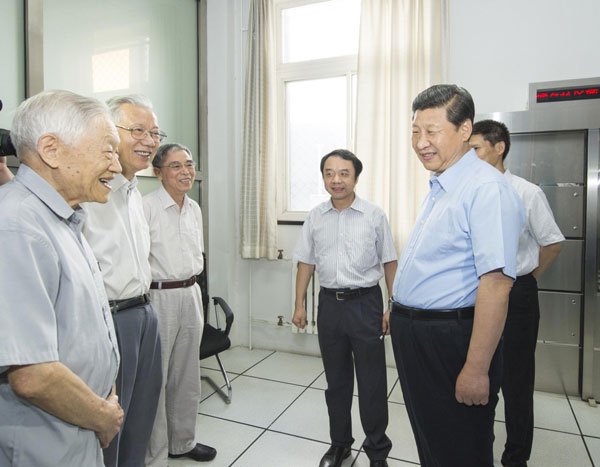Scientists called to serve
President Xi Jinping stressed the importance on Wednesday of a patriotic spirit among the scientists of China.
During a visit to the Chinese Academy of Sciences, Xi said while science has no national bounds, scientists each have their own motherland.
Xi urged scientists to keep in mind the need to serve their homeland and to benefit the people, to apply their scientific research results to the modernization of the country, and to combine their own ambitions with the Chinese dream — the rejuvenation of the country.
On Wednesday morning, Xi visited the Institute of High Energy Physics of the Chinese Academy of Sciences, and three large-scale scientific facilities there: the Beijing Electron-Positron Collider, the Beijing Synchrotron Radiation Facility and the Beijing Spectrometer.
China has faced a severe brain-drain in recent years. According to a report on news.china.com.cn, an average of 87 percent of scientists and engineers who leave China do not return.
To encourage them back, the Chinese government has started a wide range of projects offering scientific research funds, housing and other preferential treatment.
Mu-ming Poo, the founding director of the Institute of Neuroscience, under the Shanghai Institutes for Biological Sciences of the Chinese Academy of Sciences, was one senior scientist who returned to China after working abroad.
Born on the Chinese mainland and raised in Taiwan, Poo decided to contribute to the development of science in China and returned after spending many years in the US.
"Although I studied science, my interest in history and culture was continual. And I have been deeply concerned with the Chinese mainland since my childhood," Poo said in an earlier interview with China Daily.
Besides his expertise, Poo also brought back a Western management system to the institute. In the past decade, the Institute of Neuroscience has gained an international reputation for being one of the best neuroscience institutes in Asia.
"Some scientists return to China to make a contribution, while others, though working for some international cooperation projects, are trying to boost the standing of China’s scientists in the world science community," said Chen Guoming, a researcher from the Institute of High Energy Physics, who has been working on projects under the European Organization for Nuclear Research, better known as CERN.
After four decades of development, China has created a distinctive place for itself in the field of high-energy physics. Last year, when CERN announced that it had found the elusive "Higgs boson" particle, China contributed 1 percent of the cost of a related program that had a budget of around 500 million Swiss francs ($511.47 million). China also helped build two important chambers used in the Swiss project, and supplied materials to help build part of a device called an electromagnetic calorimeter.
"When Chinese scientists are taking part in the international science competition, we should do our best to increase the standing of our own country," Chen said.
During Wednesday’s visit, Xi also called for a greater focus on scientific innovation, as well as making it a driving force for China’s development.
The nation will be revitalized and become powerful if it has great scientific power, Xi said.
"Science and technology are a focal point of global competition and all major countries are trying to acquire advanced technology, including that related to national defense," he said.
Xi called for scientists to be ambitious and eliminate any obstacles that could thwart scientific development.
Xinhua contributed to this story.
Registration Number: 130349




























